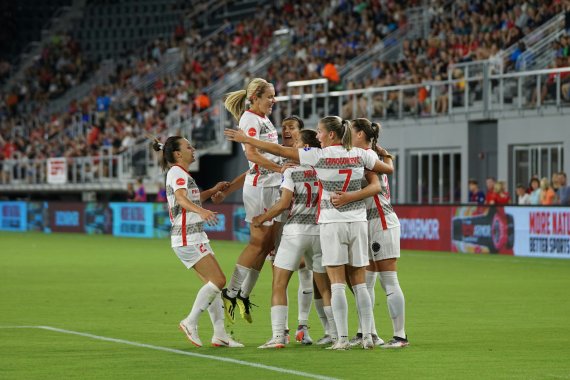
- Breaking through barriers: Women in sport
- Women can do everything men can do
- Outstanding performances, unequal rewards
- Women's soccer conquers the world stage
- Women's sport as a lucrative field for investors and sponsors
- The battle for equality in leadership roles
- Brands in focus: pioneering work for women in the sports and outdoor industry
- Women in sport set new standards
Women's day by ISPO made it unmistakably clear: women deserve the same recognition, attention and remuneration as their male colleagues - and that is a message that needs to be heard loud and clear.
The inspiring presentations offered deep insights into the challenges women face - not only in sports, but also in the industry and in global contexts. It is a time of change and these four key takeaways from Women's Day are a powerful signal for change:
- Performance and success knows no gender.
- Women's sport has enormous, previously untapped potential.
- Women belong in the top echelons of the sports industry.
- No more "shrink it, pink it": women design products that meet their needs and strengths.
Nicola Winter, who literally flies above the clouds, showed us with passion at the Women's Day by ISPO that success does not depend on gender, size or innate talent, but on unwavering will, perseverance and passion:
"With courage, empathy, discipline, passion and a little bit of luck, we can make it anywhere - even to the stars."
As a fighter jet pilot and ESA reserve astronaut, she broke through barriers that many consider insurmountable. Her message is powerful and clear: "If a man has already done it, it's very easy for a woman to do it too. Because I think we are just as capable of anything."
The financial divide in sport is a bitter reality. Female athletes like Camille Herron, who overtook her male competitors at the 2022 US Track and Field 100-mile championships, show what women can achieve. But financial recognition lags far behind. This discrepancy is reflected in salaries, prize money, media presence and sponsorship contracts. In popular sports such as basketball, golf, soccer, baseball and tennis, male athletes earn significantly more than their female counterparts, as a recent study has once again shown. An imbalance that needs to be corrected.

But there is hope and progress! The 2023 Women's World Cup has caused a stir worldwide and put the spotlight on the enormous potential of women's sport. Experts such as Bianca Rech and Theresa Severer from FC Bayern Munich have made it clear that women's soccer, with its rapidly rising spectator numbers and growing interest from sponsors, offers huge, previously untapped potential. Anita Body from Sport 1 underlines this with impressive figures: Matches involving the FC Bayern Munich women's team now attract up to 500,000 viewers to watch the Monday night game on TV - an increase of three to four times the original viewing figures. And a triumph for women's sport!
This development not only shows the recognition of sporting performance, but also reveals the economic importance of women's sport for investors and sponsors. The increasing popularity and visibility, especially in women's soccer, opens up new opportunities for sponsorship and media presence. With a diversifying fan base: more women, more young people and 40 percent of spectators who had never attended a soccer match before - according to Bettina Baer from Consulting Two Circles.
However, it's not just about visibility on the pitch, but also about representation in strategic and decisive roles behind the scenes. Jana Bernhard from "Football can do more" emphasizes with urgency: "It is high time to talk about leadership positions in the clubs. Out of 150 top positions, only four are held by women."
The challenge of underrepresentation is not limited to clubs, but is an industry-wide problem. Although progressive companies such as Vaude have a 44% share of women in their management ranks, such figures are the exception rather than the rule. Dr. Susanne Henningers, representative of the "Connecting Women" network at the Munich trade show, drew attention to a sobering fact: "Only 17 percent of management positions in the sports industry are held by women, a figure that is far from a fair 50/50 distribution." Or to put it more simply: "My impression is that there are too many men in the industry, especially at C-level." (Constanze Fuchs, Category Manager ISPO Munich).
A situation that not only represents a challenge, but also a clear call to action.
Brands like LaMunt and Kari Traa are at the forefront of a movement that is redefining the sports and outdoor sector for women. Founded and led by women, they are passionate about integrating women as key designers in the development process of their products. They are turning away from the outdated "shrink it, pink it" approach, where women's products are just scaled-down and color-matched versions of men's products. Instead, they are creating innovations that prioritize women's unique needs and strengths - from women-specific designs to female leaders setting new standards.

Women's Day by ISPO 2023 not only sent a strong signal for equality and recognition, but also sent a clear message to the world: Women in sport are here to redefine the rules and take the lead.
- Awards
- Mountain sports
- Bike
- Fitness
- Health
- ISPO Munich
- Running
- Brands
- Sustainability
- Olympia
- OutDoor
- Promotion
- Sports Business
- Textrends
- Triathlon
- Water sports
- Winter sports
- eSports
- SportsTech
- OutDoor by ISPO
- Heroes
- Transformation
- Sport Fashion
- Urban Culture
- Challenges of a CEO
- Trade fairs
- Sports
- Find the Balance
- Product reviews
- Newsletter Exclusive Area
- Magazine








